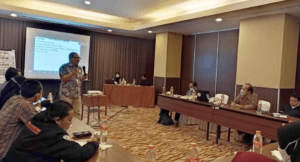Answering the Challenges in the Field of Remote Sensing Technology and GNSS through World Class Professor 2022
News
The Research Center for STKK (Research Center Marine and Earth Science and Technology) and FTSPK (Faculty of Civil Planning and Geo Engineering), together with Chiba University, have successfully held the World Class Professor 2022 program. Besides increasing the competence of lecturers and institutions, the Research Center for STKK and FTSPK is trying to answer challenges in mapping surveys, especially in terms of remote sensing satellite imagery technology and GNSS (Global Navigation Satellite System).
The challenge is to develop remote sensing and GNSS technology that is more accurate, the implementation stages faster, the display more user-friendly, and the technology more affordable. This reason prompted ITS to invite Professor Josaphat Tetuko Sri Sumantyo from the Josaphat Microwave Remote Sensing Laboratory (JMRSL), Center for Environmental Remote Sensing, Chiba University.

Workshop Writing High Impact Scientific Articles
In WPC 2022, various activities are carried out to develop remote sensing technology and GNSS. The first activity was a workshop entitled “Integration of IMU, GNSS and Remote Sensing for Mapping Natural Resources and Infrastructure in Indonesia” as a first step in mapping problems and solutions for using remote sensing technology and GNSS in Indonesia.
Furthermore, a workshop was held, “Writing High Impact Scientific Articles,” as a provision for lecturers and institutions to conduct research and write quality and impactful papers. They were also holding fine-tuning to prepare papers to be published.
WCP 2022 also produced 3 papers that have been submitted to international journals. The 3 papers are “Analysis of the 2021 Cumbre Vieja Eruption Effect on Water Vapor Content and Atmospheric Particles Using GNSS and Remote Sensing Methods” (Geodesy and Geodynamics), “Variations of CO, NO2, SO2, 03, PM10, and PM2.5 with Central Distribution of COVID-19 Omicron Variant in Surabaya” (GeoJournal) and “3-D Traveling Ionospheric Disturbances during the 2022 Mount Tonga Eruption Using GNSS TEC” (Journal of Geophysical Research).
In addition to preparing quality and impactful research and papers, the STKK Research Center and FTSPK have collaborated with Chiba University. This collaboration includes developing low-cost GNSS antennas, developing JFSEU research results, and agreeing to write a book in the field of GNSS applications.
The STKK Research Center and FTSPK will continue to develop remote sensing technology and GNSS so that the goal of creating better technology, both in terms of accuracy, work effectiveness, and lower prices, can be achieved.
Latest News
-
ITS Optimizes Multicolor LED Technology and Low-Cost GNSS as Solution to Fishermen’s Problems in Lobuk Village
Lobuk Village, located in Bluto District, Sumenep Regency, East Java, is an independent village with most of its population
-
ITS Introduces Low-Cost Technology to Increase Fishermen’s Income in Lobuk Village
Lobuk Village is a village located in Bluto District, Sumenep Regency, East Java. Although it has won the title
-
ITS Technology Innovation Increases Fishermen’s Productivity in Lobuk Village
Sumenep – Fishermen in Lobuk Village, Bluto District, Sumenep Regency, now have new hope thanks to the technological innovation





